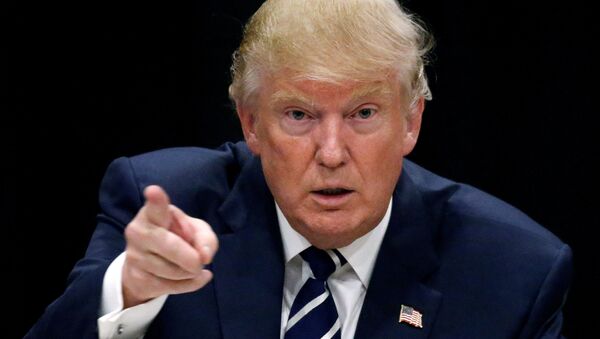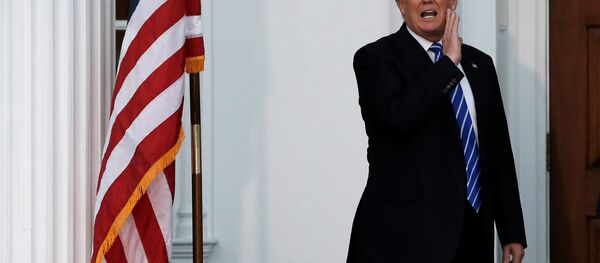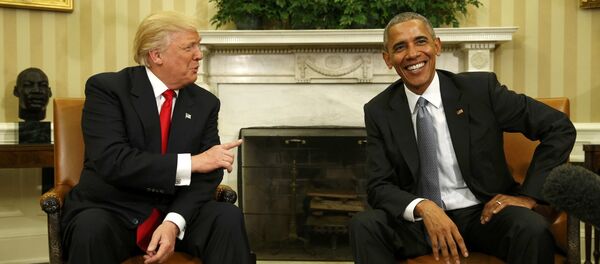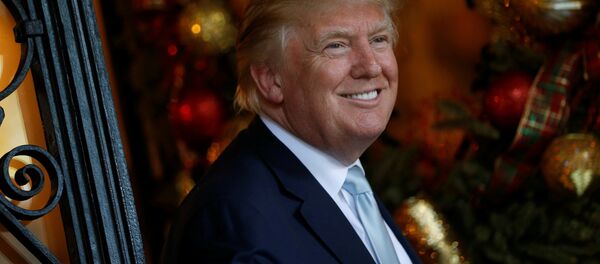Moreover, Trump has pledged to advance US core interests and rebuild the country’s military, while simultaneously trying to ease tensions in the world.
FIGHT AGAINST THE ISLAMIC STATE TERROR GROUP
Trump’s plan to defeat Daesh has become one of the most widely-discussed topics of the 2016 presidential race. In the beginning, Trump refused to provide any details of his plan, claiming that he did not want terrorists to learn about US intentions.
In September, however, Trump outlined his approach to fighting Daesh in a national security speech.
"Immediately after taking office, I will ask my generals to present to me a plan within 30 days to defeat and destroy ISIS [Daesh]," he said. "We should work with any country that shares our goal of destroying ISIS and defeating Radical Islamic terrorism, and form new friendships and partnerships based on this mission."
Trump has called for cooperation with "our Arab allies and friends in the Middle East" in the fight against the terrorists, and said he would weigh an alliance with Russia for that purpose as well.
The United States will undertake "aggressive joint and coalition military operations" against Daesh, according to Trump’s plan. The country will also look to boost intelligence sharing and cyberwarfare in order to disrupt terrorists’ propaganda and recruiting campaigns.
At the same time, Trump said rebuilding the US military and empowering generals to destroy Daesh will free the United States from endless wars seeking to topple foreign governments.
"We will abandon the reckless regime change favored by my opponent [Hillary Clinton] and we will instead work with our allies to advance the core national security interests of the United States," Trump stated.
Additionally, Trump’s plan highlights intent to defeat radical Islam by promoting the US system of government and way of life.
"I will proudly promote our system of government and our way of life as the best in the world — just like we did in our campaign against communism during the Cold War," Trump said in September.
To keep foreign fighters out of the United States, Trump proposed to establish new screening procedures and enforce existing immigration laws. Moreover, he suggested to temporarily suspend immigration from volatile regions with history of exporting terrorism.
On December 15, US Secretary of Defense Ashton Carter said the United States should maintain its active involvement in the efforts of the anti-Islamic State coalition under the Trump administration.
Earlier in December, US media reported that the Defense Department is preparing a number of proposals for the Trump administration aimed at intensification of US campaign against Daesh.
Military officials are likely to propose easing restrictions on a number of US servicemen needed to take part in specific operations and reduction of White House involvement in the decision making process regarding an operation or airstrike, according to media reports.
AN ARGUMENT IN FAVOR OF SURVEILLANCE
Earlier in December, the president-elect said he "would be fine" with restoration of the USA Patriot Act under which US law enforcement agencies conducted mass surveillance of individuals abroad as well as in the United States.
A month after the September 11, 2001 terror attacks, President George W. Bush signed the USA Patriot Act to expanded government surveillance of Americans’ online activities and authorized the bulk collection of telephone data. In 2015, US Congress approved provisions to the Patriot Act to rein in the National Security Agency’s controversial mass surveillance program.
Trump has also floated the idea of increased surveillance and patrol of Muslim neighborhoods until the frequency of terror attacks within the United States drops. In addition, he suggested creating a database that would track Muslims. Trump’s team later stated, however, that the president-elect has never advocated for any specific databases.
Earlier in December, more than 1,500 people, including some 200 employees of such tech companies as Google and Twitter, signed an open letter pledging not to assist the Trump administration with creation of any kind of data registry for tracking people based on their religious views.
THE GUANTANAMO CONTROVERSY AND TORTURE
During the 2016 presidential campaign, Trump's casual remarks about the legitimacy of extreme interrogation techniques, described by many analysts as torture, sparked a much debated controversy.
Last week, Canada’s intelligence chief Michael Doucet reportedly said Ottawa may have to rethink how it provides intelligence to the United States if Trump makes good on his vow to torture captive extremists.
Concurrently with backing enhanced interrogation techniques, Trump has expressed his intention to keep open the US detention facility in Guantanamo Bay, Cuba open, even though outgoing Obama has made a significant effort to close the infamous prison.
"We're gonna load it up with some bad dudes, believe me, we're gonna load it up," Trump said in November.
Trump indicated in August that he might push for US citizens accused of terrorism to be tried in a military tribunal in the Guantanamo prison.
"I would say they could be tried there, that would be fine," Trump said.
NEW APPROACH TO REGIONAL PARTNERSHIPS
Trump has criticized NATO allies for not pulling their weight, while on the campaign trail he threatened to withdraw the United States from what he described as an obsolete organization if the allies did not deliver on their financial obligations.
Trump has pledged to request all NATO nations to promptly pay their bills. He argued that only five NATO members, including the United States, are meeting the minimum requirement to spend 2 percent of their GDP on defense.
"Additionally, I will be respectfully asking countries such as Germany, Japan, South Korea and Saudi Arabia to pay more for the tremendous security we provide them," Trump said in September.
A member of the US House Committee on Armed Services, Congressman Robert Wittman told Sputnik on December 7 that the new Trump administration will also assess US strategy toward Ukraine.
"I don’t know whether the first effort would be assistance, but I do think that this administration will address the strategic elements of what we do in our relationship with Ukraine," Smith said.
Since 2014, the United States has provided Ukraine with $600 million in military assistance, including training, equipment and reform advisory effort, according to the Defense Department.







